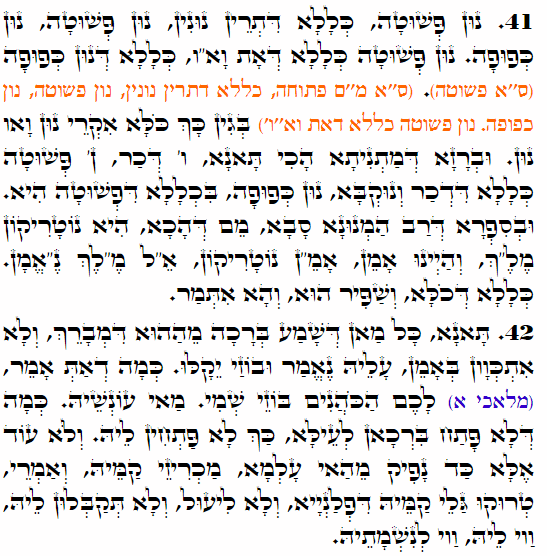Daily Zohar # 3725 – Vayelech – Honor him for your sustenance
Hebrew translation:
.
Zohar Vayelech
#41
The final Nun ן is extended and includes the bent Nun נ that is the aspect of the Nukva, female of Zeir Anpin. The ‘ן’ includes the letter Vav ‘ו’ that is male, Zeir Anpin, so the final Nun ‘ן’ has male and female aspects. Vav ‘ו’ is for Zeir Anpin, and ‘נ’ is for Malchut. Because of that, the name of the letter ‘Nun’ ‘נון’ and its three letters has all the aspects in it.
In the book of Rav Hamnuna Sava we read, the Mem ‘מ’ of ‘אמן’ Amen, is initial for ‘מלך,’ ‘King,’ and the initials of אמן are אל מלך נאמן, ‘faithful king’ that represents the whole.
#42
We learned that anyone that heard a blessing said by another and didn’t meditate on the Amen; it was said about him, “those who despise Me shall lose honor” (1 Samuel 2:30). More so, the priests that don’t honor the name.
Malachi 1:6
“בֵּן יְכַבֵּד אָב וְעֶבֶד אֲדֹנָיו וְאִם אָב אָנִי אַיֵּה כְבוֹדִי וְאִם אֲדוֹנִים אָנִי אַיֵּה מוֹרָאִי אָמַר יְהוָה צְבָאוֹת לָכֶם הַכֹּהֲנִים בּוֹזֵי שְׁמִי וַאֲמַרְתֶּם בַּמֶּה בָזִינוּ אֶת שְׁמֶךָ.”
“A son honors his father, And a servant his master. If then I am the Father, Where is My honor? And if I am a Master, Where is My reverence? Says YHVH of hosts To you priests who despise My name. Yet you say, ‘In what way have we despised Your name?’”
The punishment for those people would be the same because they didn’t create openings for blessings to come to the world, so when such a person leaves the world, it would be said about him, close openings for this person so he won’t enter and won’t be accepted—woe to him and his soul.
Lesson;
When a son honors his father, he connects to his spiritual line, and a servant honors his master connects him to his sustenance.
HaShem tells us to honor him as a father or obey his laws as a master so he can reward us. Honoring Hashem elevates us to a level where he can support and sustain us.
The priests have a greater responsibility because their meditation affects the nation and the entire world.
{||}

 Previous: Vayelech
Previous: Vayelech

